The cooler months are here in Australia, so preparing your Mercedes-Benz diesel engine vehicle for the unique challenges of winter driving is now important. While our winters may not bring blizzards and icy roads like those in other parts of the world, there are still specific considerations to ensure your vehicle operates smoothly and safely during the cooler season. Here, we’ll explore essential tips for winterising your Mercedes-Benz diesel to navigate the winter conditions with ease.
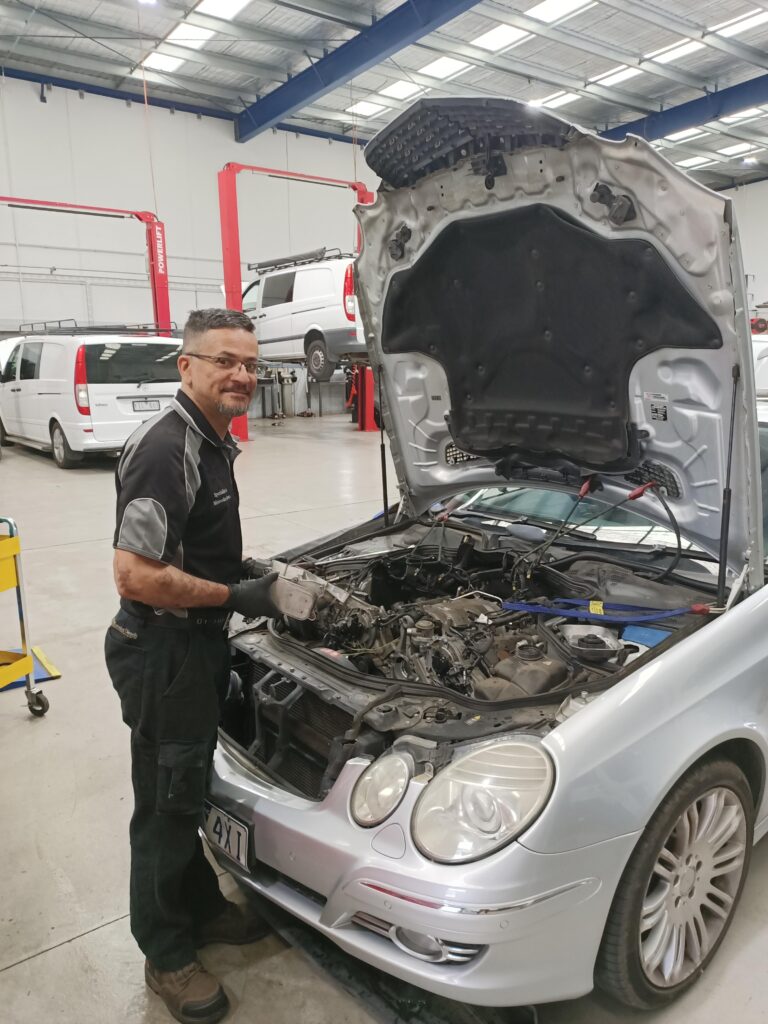
Fluid Check and Change:
Start by checking all vital fluids in your Mercedes-Benz. Ensure that the engine oil, coolant, and washer fluid are at appropriate levels. While extreme cold may not be as much of a concern in Australia, ensuring your vehicle’s fluids are in top condition ensures optimal performance regardless of the temperature. Cold weather can cause oil to thicken, making it more difficult for the engine to start and circulate oil properly, so consider switching to a winter-grade engine oil with a lower viscosity rating (recommended by the manufacturer) if starting becomes noticeably harder. Thinner oil flows more easily in cold temperatures, reducing engine wear during cold starts and providing better lubrication during initial start-up. Most coolants will have a temperature rating that covers the temperatures seen in Australian winters, but if you have any doubts about your coolant or if it is at an appropriate level, you’re welcome to reach out to us.
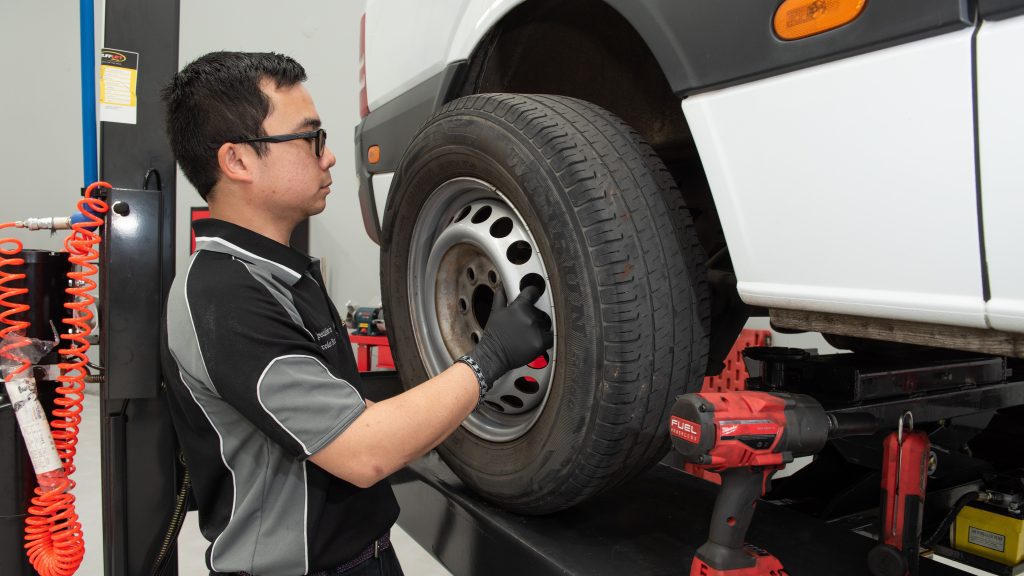
Battery Check:
While Australian winters are milder compared to other regions, cold temperatures can still affect battery performance, along with the added battery power needed for lights, windscreen wipers and heaters. If your battery is on its way out, chances are it will show symptoms of failure during the colder months. It’s important to have your battery tested to ensure it’s in good condition and fully charged. In a Mercedes-Benz, there are a lot of electrical components that rely on a healthy battery, so any strange “electrical gremlins” like buttons not working, screens not turning on, central locking behaving badly are usually caused by a low state of charge. Replacing old or weak batteries can help prevent unexpected breakdowns and keep all of your vehicle’s functions working properly on chilly days.
Tyre Maintenance:
Proper tyre maintenance is essential year-round, but especially in winter. Check your tyres for adequate tread depth and even wear. While snow and ice are not as common in many parts of Australia, heavy rainfall and slick roads can still pose challenges with random patches of black ice forming. As summer tyres stiffen when temperatures reach below 7 degrees it is important to consider the road conditions and drive accordingly. If you expect to travel frequently in areas that will see freezing conditions (such as the high country or regular ski trips), switching to all-season tyres could be an option for you as they can handle both the cool of winter and the heat of summer, making it cheaper than buying summer and winter tyres. The cool temperature of winter can also lower tyre pressure, causing under-inflation of the tyre, therefore it is important that once the temperature drops that tyre pressures are checked and more air added if required. Proper tyre pressures seem trivial but are vital to maintaining traction on wet and slick roads, plus also improve fuel economy and prolong the life of your tyre.
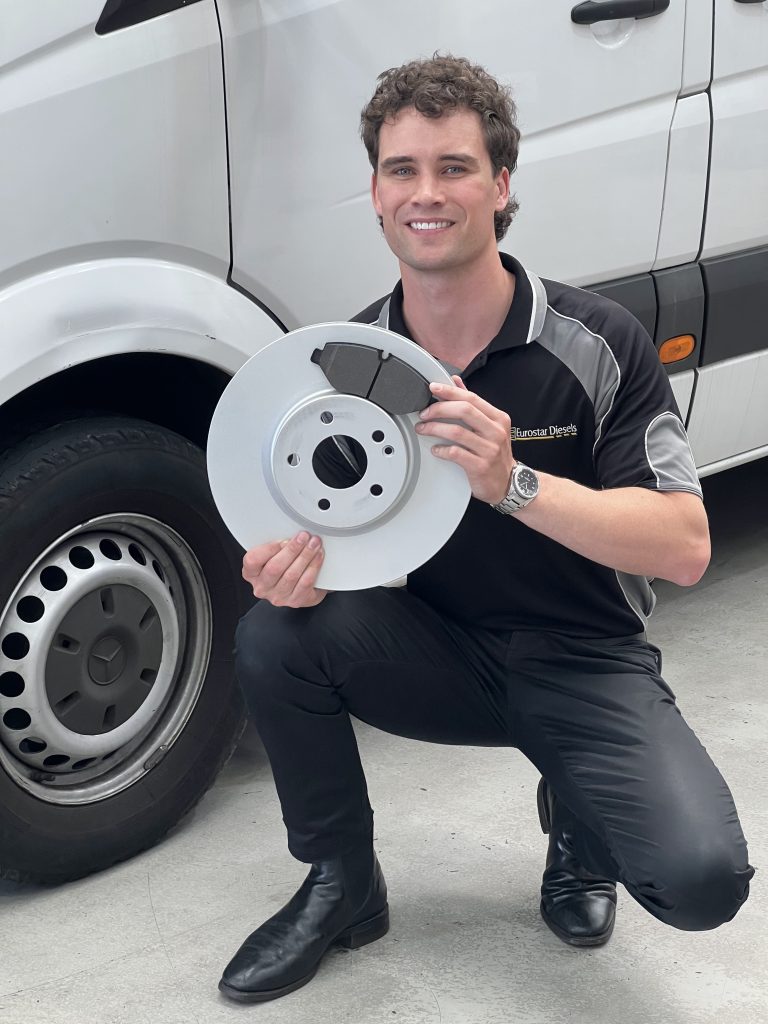
Brakes and Brake Pads:
Ensuring your Mercedes’ braking system is properly “winterised” is essential for maintaining control and safety on icy or wet roads. We’re experts at braking systems on Mercedes vehicles so we are more than happy to carry out an inspection of your braking system. However, you will know if your brakes need inspecting if they are regularly squealing when braking, feel weaker than normal, or make an unpleasant grinding noise. If the brake pads are worn down or there are any signs of uneven wear or damage on the rotors, replacing them promptly is important to maintain optimal braking performance – a must-have in wet and cold conditions. An element of the braking system that is often overlooked is the brake lines (both hard lines and flexible hoses). You can carry out a visual inspection yourself, just check behind your wheels at these lines for any signs of leaks, cracks, or damage. Cold weather can cause rubber components to become brittle, increasing the risk of brake fluid leaks or brake failure. Replacing any damaged brake lines or hoses are critical to prevent catastrophic braking issues. Finally, you can simply test the complete operation of your brakes to ensure they are responsive and provide consistent stopping power. The best way to do this is find a quiet street with no traffic, and perform a full emergency stop when safe to do so. If you notice any unusual noises, vibrations, or sponginess when applying the brakes, have them inspected by us ASAP.
Headlights and Indicators Maintenance:
Properly functioning lights and indicators are essential for safe driving, especially during the darker days of winter. Inspect all exterior lights, including headlights, taillights, brake lights, and indicators, to ensure they are working correctly. Replace any bulbs that are burnt out or dim. Additionally, clean the lenses to remove any dirt, or grime buildup that could obstruct visibility.
Engine Preheating:
Due to the way a diesel engine operates, a Glow Plug’s job of starting an engine can get harder over the cooler months. It’s important to turn the key of your diesel powered Mercedes to the on position, wait for the glow plug light to turn off then proceed to start the engine. Push-button-start Mercedes vehicles do this automatically when you proceed to start the engine. Once your engine is running, it’s advised to let the engine idle for a bit to preheat the engine coolant and oil. This will reduce wear on engine components and provide added longevity to your engine, transmission and differential(s).
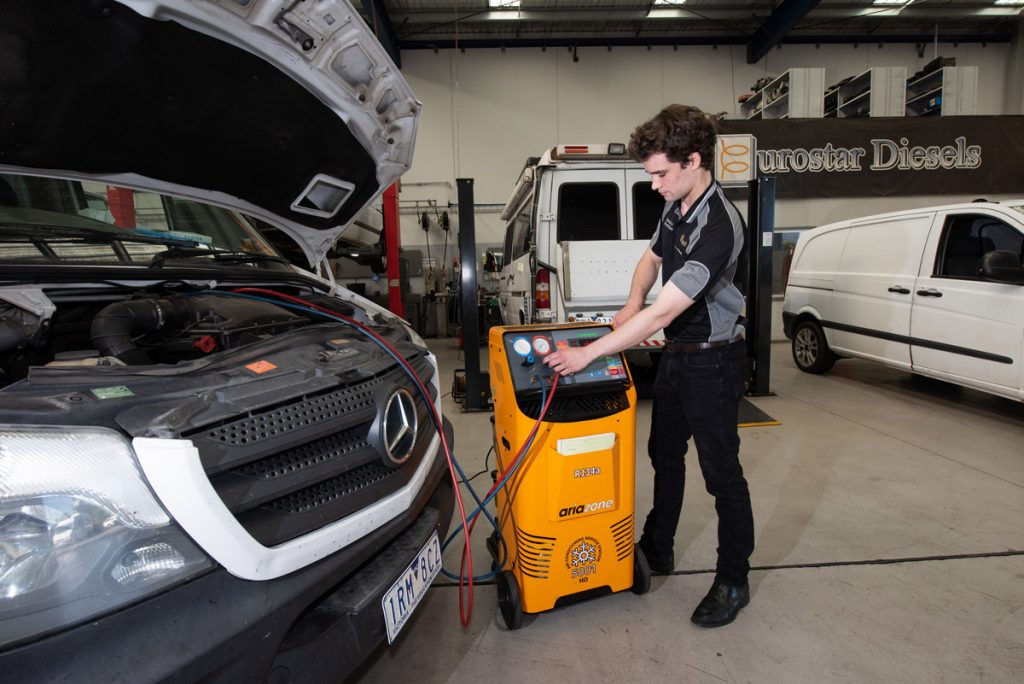
Heating and Airconditioning System Check:
If you’re located in Victoria – like we are – the chances are that your climate control is already set to “heat”. With colder mornings and colder days ahead, it’s important to make sure your heater is in good working order for your overall comfort, plus also ensuring that your air-conditioning system is working to reduce fogging of your windscreen and windows. You’ll know pretty quickly if your heating or air conditioning systems need inspecting, as poor heating performance or consistent fogging of windows will occur. Eurostar Diesels can inspect the heater core, blower motors, air conditioning charge and your vents for any signs of damage or blockages if you’re experiencing issues.
Wiper Blade Replacement:
Clear visibility is essential regardless of the weather. Inspect your wiper blades for wear and replace them if necessary. You’ll know if you need to replace your wiper blades if they are regularly screeching, juddering or jumping on your windscreen as you use them. Upgrading to high-quality blades designed to handle heavy rainfall can improve visibility during winter rain and storms. We keep stock of these for Mercedes-Benz vehicles.
Emergency Kit Preparation:
While Australian winters are generally mild, it’s still a good idea to be prepared for unexpected situations while on the road. Ensure your vehicle is equipped with an emergency kit containing essentials such as a torch, blanket, non-perishable food, water and a first-aid kit. Additionally, consider adding items like an umbrella and raincoat if you get caught in the wet weather.
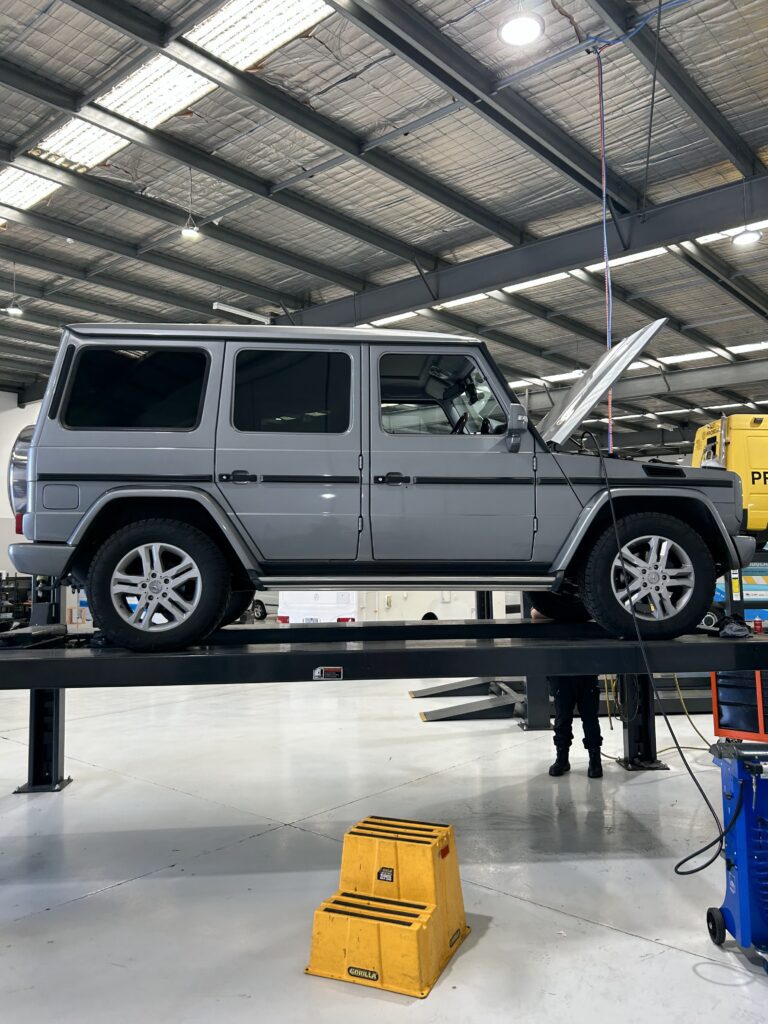
Exterior Protection:
Protecting your vehicle’s exterior from winter elements can help maintain its appearance and longevity. While it might seem counter-intuitive to wash your car during rainy and miserable conditions, regularly washing the road grime and mud that your vehicle will accumulate from winter roads is highly recommended. This can help keep your paintwork and vehicle’s body from suffering from these dirts and grime from settling into the paint or panel gaps, potentially causing long-term damage that will need professional detailing or repairs in the future. Don’t forget to pressure wash under your vehicle if you do regular gravel or dirt driving during winter!
Finally, an obvious one…
Driving Practices:
Adjust your driving habits to suit winter conditions, including reducing your speed to provide a larger gap for a more appropriate following distance during wet weather. Use caution when braking and cornering on wet roads, and be mindful of potential hazards such as fallen branches, debris or pot holes formed during down pours.
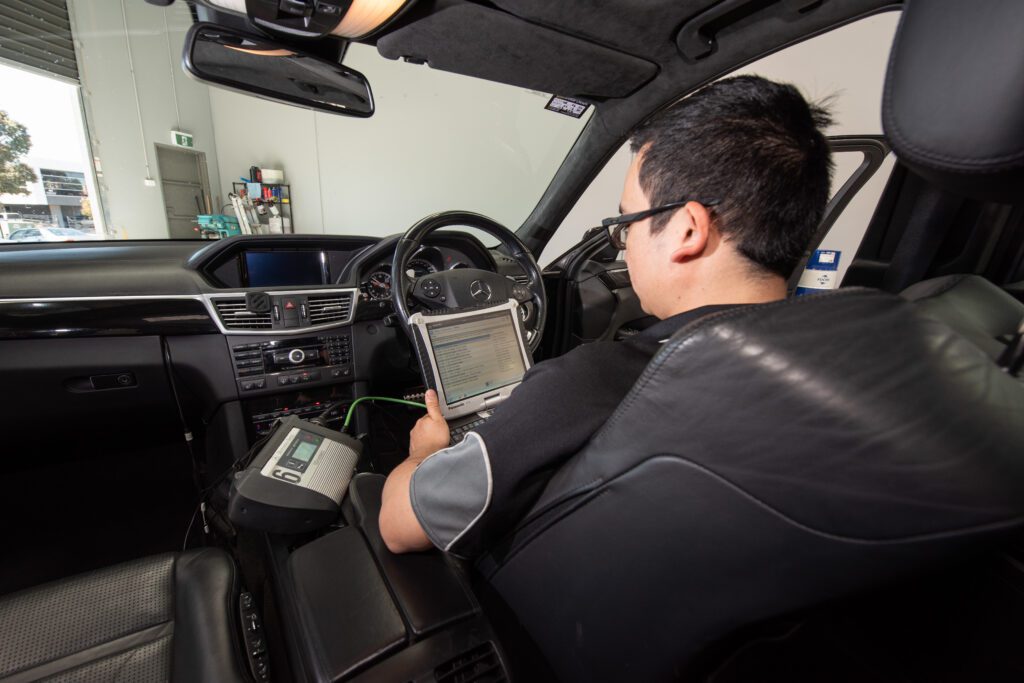
In conclusion, while Australian winters may not be as harsh as those in other parts of the world, preparing your diesel powered Mercedes-Benz for the cooler season is still important for safe and reliable motoring. We also implore you to drive to the conditions to keep you and other road users safe.
By following these tips, you can ensure your vehicle is ready to tackle whatever challenges winter brings, from heavy rainfall to cooler temperatures. While most of the mentioned checks may be performed at home, if you would like a professional opinion or need any components replaced, we highly recommend you book in with the professional team at Eurostar Diesels. We know our diesel-powered Mercedes vehicles like the back of our hand, and would be more than happy to winterise your vehicle! Stay safe and enjoy the drive, no matter the weather!
